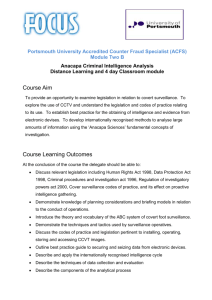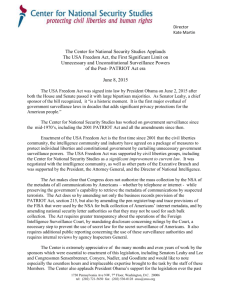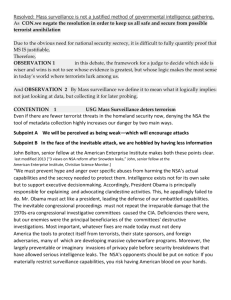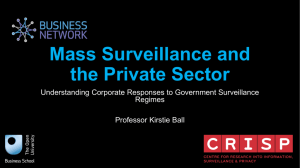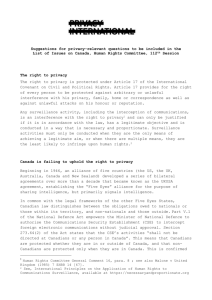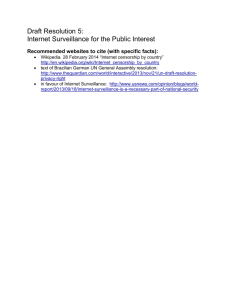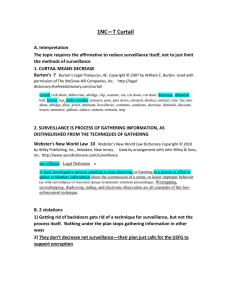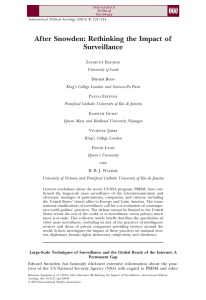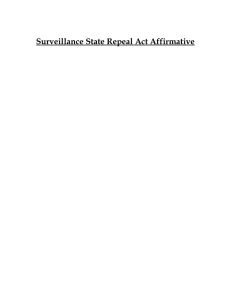Exemplar Essay 1
advertisement
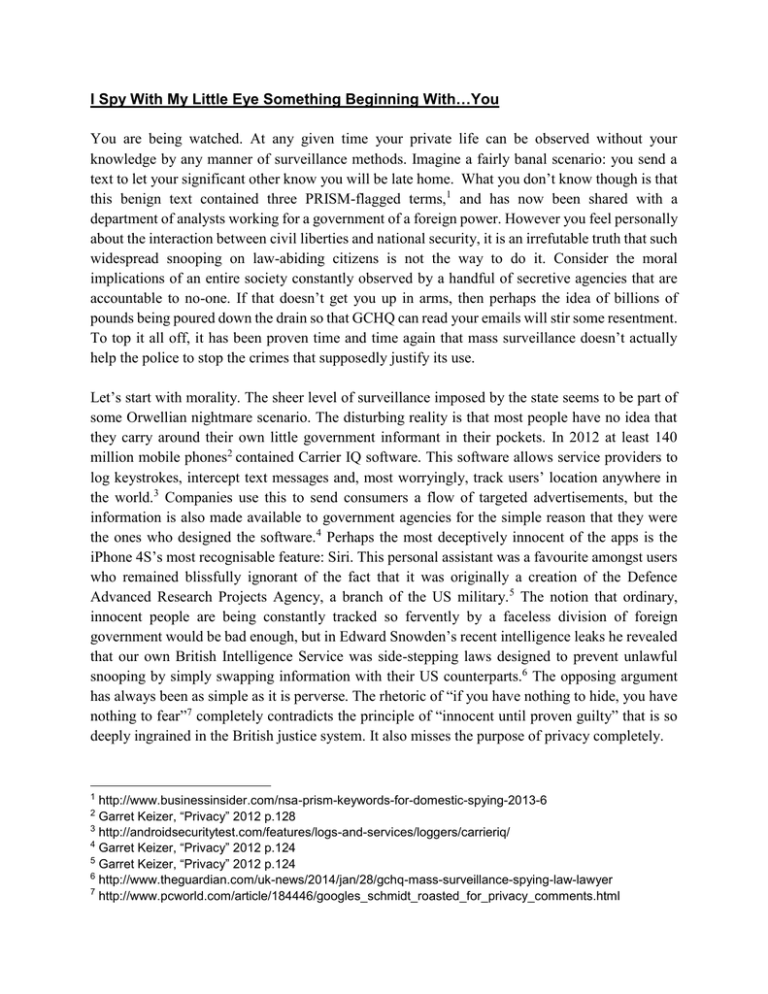
I Spy With My Little Eye Something Beginning With…You You are being watched. At any given time your private life can be observed without your knowledge by any manner of surveillance methods. Imagine a fairly banal scenario: you send a text to let your significant other know you will be late home. What you don’t know though is that this benign text contained three PRISM-flagged terms,1 and has now been shared with a department of analysts working for a government of a foreign power. However you feel personally about the interaction between civil liberties and national security, it is an irrefutable truth that such widespread snooping on law-abiding citizens is not the way to do it. Consider the moral implications of an entire society constantly observed by a handful of secretive agencies that are accountable to no-one. If that doesn’t get you up in arms, then perhaps the idea of billions of pounds being poured down the drain so that GCHQ can read your emails will stir some resentment. To top it all off, it has been proven time and time again that mass surveillance doesn’t actually help the police to stop the crimes that supposedly justify its use. Let’s start with morality. The sheer level of surveillance imposed by the state seems to be part of some Orwellian nightmare scenario. The disturbing reality is that most people have no idea that they carry around their own little government informant in their pockets. In 2012 at least 140 million mobile phones2 contained Carrier IQ software. This software allows service providers to log keystrokes, intercept text messages and, most worryingly, track users’ location anywhere in the world.3 Companies use this to send consumers a flow of targeted advertisements, but the information is also made available to government agencies for the simple reason that they were the ones who designed the software.4 Perhaps the most deceptively innocent of the apps is the iPhone 4S’s most recognisable feature: Siri. This personal assistant was a favourite amongst users who remained blissfully ignorant of the fact that it was originally a creation of the Defence Advanced Research Projects Agency, a branch of the US military. 5 The notion that ordinary, innocent people are being constantly tracked so fervently by a faceless division of foreign government would be bad enough, but in Edward Snowden’s recent intelligence leaks he revealed that our own British Intelligence Service was side-stepping laws designed to prevent unlawful snooping by simply swapping information with their US counterparts.6 The opposing argument has always been as simple as it is perverse. The rhetoric of “if you have nothing to hide, you have nothing to fear”7 completely contradicts the principle of “innocent until proven guilty” that is so deeply ingrained in the British justice system. It also misses the purpose of privacy completely. 1 http://www.businessinsider.com/nsa-prism-keywords-for-domestic-spying-2013-6 Garret Keizer, “Privacy” 2012 p.128 3 http://androidsecuritytest.com/features/logs-and-services/loggers/carrieriq/ 4 Garret Keizer, “Privacy” 2012 p.124 5 Garret Keizer, “Privacy” 2012 p.124 6 http://www.theguardian.com/uk-news/2014/jan/28/gchq-mass-surveillance-spying-law-lawyer 7 http://www.pcworld.com/article/184446/googles_schmidt_roasted_for_privacy_comments.html 2 Now give a thought to how much this level of surveillance has to cost. As the country suffers through the worst economic downturn since the Great Depression,8 the idea that the government is spending taxpayers’ money tracking a teenager who used the word “tyrant” in a text about his maths teacher9 is unpalatable to most. Unfortunately - or perhaps fortunately - the budget of the intelligence services is classified, so we cannot know exactly how much they are spending. Being told that we don’t need to know how much is spent tracking what we spent on bleach last year is less than amusing when the estimations are examined. According to an expert, the NSA spends around $10.8 billion dollars10 annually. In the UK, the budget of Her Majesty's Government Communications Centre is at least £1 billion.11 Consider that for a moment. As the UK’s national debt soars into numbers that are difficult to pronounce and new public sector cuts are announced every day, the Treasury is spending money on a single organisation devoted to reading citizens’ tweets. Why? For national security, of course! Supporters of the intelligence service’s vast wealth argue that this is the minimum amount needed to maintain their surveillance programmes, and that since their work in counter-terrorism saves lives it is essential public machinery. This may be true, but it should be noted that other branches of government that also have the responsibility to save lives and defend the country are having their budgets slashed. The Equality and Human Rights Commission has had its budget halved this year12. In the defence sector, things are no different: who could forget the scrapping of the RAF’s entire complement of Harrier jets just before the British government pledged itself to maintaining the No-Fly zone over Libya?13 Throughout all these cuts, the intelligence services have continued to waste resources tracking British citizens who have committed no crime. Perhaps the most useful information that GCHQ can pass on to the government is exactly how empty everyone’s pockets have become. In the face of these glaring failings, it should at least be possible to say that surveillance is saving us from the bad guys. Unfortunately, this is also simply not the case. Despite the masses of information that intelligence agencies have acquired, there is little evidence to suggest that it has diminished the threat of terrorism. It’s hardly surprising to hear that the perpetrators of the Boston Bombing were known to the FBI counter-terrorism department14 or that the murderers of Drummer Lee Rigby were flagged on a MI5 database,15 given that the same could be said of almost every member of the adult population. The decision to collect every possible piece of information about every single citizen has drowned out any real threats in a mass of white noise. Furthermore, the 8 http://www.telegraph.co.uk/news/9826857/Britain-is-experiencing-worse-slump-than-during-GreatDepression.html 9 http://www.businessinsider.com/nsa-prism-keywords-for-domestic-spying-2013-6 10 http://www.nytimes.com/2013/08/30/us/politics/leaked-document-outlines-us-spending-onintelligence.html?hp&pagewanted=all&_r=0 11 http://www.theguardian.com/world/interactive/2013/aug/01/gchq-spy-agency-nsa-edward-snowden 12 http://www.theguardian.com/society/2012/may/15/equality-human-rights-commission-cuts 13 http://www.channel4.com/news/libya-axed-harriers-could-have-saved-lives 14 http://www.politico.com/blogs/under-the-radar/2013/06/fbi-knew-earlier-of-boston-bombing-suspect166313.html 15 http://www.theguardian.com/uk-news/2013/dec/19/mi5-lee-rigby-murder-adebolajo-adebowale information itself is worthless if the police are too under-funded and over-stretched to make use of it. This disconnect was observed earlier this year in London, when terror suspect Mohammed Ahmed Mohamed, eluded his police minders and avoided being recaptured in the city with the most CCTV cameras per metre in the world16 by simply cutting off his ankle tag and donning a burqa.17 This seemingly easy escape shows the ridiculousness of the belief that constant monitoring somehow improves our safety and helps catch criminals. It hardly takes an expert to theorise that Mr Mohamed probably won’t be logging into Facebook or texting on his Carrier IQequipped mobile any time soon. After information about PRISM and other means of government surveillance were leaked, the US promptly closed 22 consuls and embassies across the Middle East.18 Apparently, thanks to NSA surveillance programmes, the US had managed to intercept a conference call between the leaders of various regional al-Qaeda groups discussing an imminent attack on the US - these dastardly villains had conveniently missed the headlines about the NSA tapping their phones. Yet no further action was taken by the US as a result of the interception, showing up the most expansive information tapping network ever created as little more than a faulty early-warning system which barely even works when it’s most needed. The dogged determination of the government to ensure every tweet, status update and text message is read and catalogued by an analyst shows only one thing: their failure to realise that if something is morally wrong, financially unsustainable, and ineffective in its stated aim then the logical thing is to avoid doing it. Unfortunately, as the so-called “War on Terror” continues it is likely to herald the introduction of more laws allowing the surveillance of private citizens and more funding for the agencies that do it. The question that does deserve some thought is that if the surveillance state is so ineffective, expensive, and immoral why does it continue to exist? Why does the state continue to mistrust its population and work so very hard to sniff out anything that might even hint at a threat to its existence? Not too much thought, though. After all, Big Brother is watching. Word Count: 1,298 16 http://www.telegraph.co.uk/technology/10172298/One-surveillance-camera-for-every-11-people-inBritain-says-CCTV-survey.html 17 http://www.bbc.co.uk/news/uk-24826379 18 http://edition.cnn.com/2013/08/03/politics/embassies-list/

